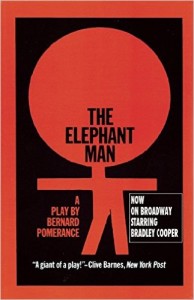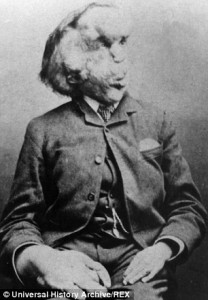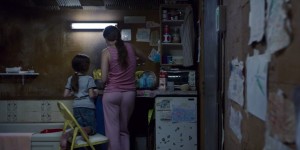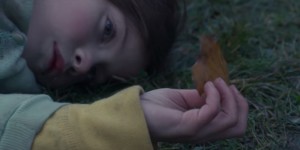 Today, I will be analyzing the play, The Elephant Man, by Bernard Pomerance. The play tells the story of John Merrick, who was born with a congenital disorder that allows him to earn his living as the “elephant man” in a freak show. Dr. Treves wants to study Merrick’s disorder and invites him to live at the London Hospital. Initially seen as only a freak, Merrick’s humanity becomes more and more apparent as he meets more people. Eventually Merrick’s condition causes his death and the readers see his impact on the world he touched.
Today, I will be analyzing the play, The Elephant Man, by Bernard Pomerance. The play tells the story of John Merrick, who was born with a congenital disorder that allows him to earn his living as the “elephant man” in a freak show. Dr. Treves wants to study Merrick’s disorder and invites him to live at the London Hospital. Initially seen as only a freak, Merrick’s humanity becomes more and more apparent as he meets more people. Eventually Merrick’s condition causes his death and the readers see his impact on the world he touched.
Bernard Pomerance was born in Brooklyn, New York in 1940. He studied at the University of Chicago and moved to London in 1968. His first play, High in Vietnam, Hot Damn was performed first in 1972. The Elephant Man was produced originally in 1977. It won the Tony Award for Best Play. The play was produced into a film in 1980.
The Elephant Man was based on the life of a real man,
 Joseph Merrick, who was born on August 5, 1862 in England. It is now known that he suffered from Neurofibromatosis type I and Proteus syndrome. He was born with no outward symptoms of any disorder for the first few years of his life. At age 5 he began to start showing symptoms with thick, lumpy skin, similar to an elephant. He then began developing swellings and lumps all over his skin. His family explained his symptoms as a result of his mother being knocked over by a circus elephant while pregnant with Merrick. This is where the name elephant man originates. He tried several jobs, but his condition left him too deformed and disabled, so he chose to be in a freak show, which were very popular in England at the time.
Joseph Merrick, who was born on August 5, 1862 in England. It is now known that he suffered from Neurofibromatosis type I and Proteus syndrome. He was born with no outward symptoms of any disorder for the first few years of his life. At age 5 he began to start showing symptoms with thick, lumpy skin, similar to an elephant. He then began developing swellings and lumps all over his skin. His family explained his symptoms as a result of his mother being knocked over by a circus elephant while pregnant with Merrick. This is where the name elephant man originates. He tried several jobs, but his condition left him too deformed and disabled, so he chose to be in a freak show, which were very popular in England at the time.
The Elephant Man tells the story of John Merrick, the elephant man. Treves, a surgeon, stumbles upon a freak-show and becomes intrigued with Merrick’s condition. Merrick’s manager, Ross, agrees to allow Treves to study Merrick. Merrick goes from one freak show to another of sorts, when Treves makes Merrick stand on display while he describes Merrick’s condition to the audience. Pomerance highlights the acceptable and not-acceptable dehumanization of Merrick.
As the play continues, Merrick meets more and more people. While most are initially horrified at his external appearance, everyone he meets becomes intrigued and taken by him. Merrick externally appears more animalistic than human compared to his visitors, but it seems that Merrick is more human than them. Merrick changes the lives of everyone he meets. Here, Pomerance explores what defines humanity.
Eventually, Dr. Treves admits that Merrick is dying and nothing he can do can save him. Merrick goes to sleep sitting up, a posture that he must use to keep the weight of his head from suffocating him. In a dream-like state, Merrick is laid down to sleep normally and he dies. In the end, the elephant man died like a ‘normal’ man. His human masculinity triumphed in the end.
The final scene of the play depicts Treves writing Merrick’s obituary. He initially includes the aspects of Merrick’s humanity he only learned after getting to known him. He changes it last minute saying that it’s too late, describing Merrick only as the elephant man instead of the human man. In the end Merrick was known for his animalism instead of his humanity.
I was lucky enough to read this play and then see the movie and the play. This allowed me to see the translation from words to the screen or stage. It was particularly interesting to see the differences in interpretation, from me, to the director of the movie, to the director of the play because we all read the same play.
 Bradley Cooper, who played Merrick on Broadway last year, came to my English class to lead class on the discussion of the play. He graduated from my high school and still remains close with my English teacher so my English teacher surprised us one day. I was able to get the perspective of someone, who has studied this play for many years and also see the behind the scenes work of the translation from play to stage. We primarily discussed the transition of Merrick from being viewed as a freak and being viewed as a human. Merrick is viewed as a freak when the only picture you get is the image of a disfigured, thing, that barely even looks human. Merrick doesn’t talk more than a grunt well into the play, but once he does speak, he is human and more than that he is an intelligent human being. Once the characters and the reader get to known Merrick past his disfigurement, he becomes human in our eyes. But he always was, we just hadn’t taken the time to realize.
Bradley Cooper, who played Merrick on Broadway last year, came to my English class to lead class on the discussion of the play. He graduated from my high school and still remains close with my English teacher so my English teacher surprised us one day. I was able to get the perspective of someone, who has studied this play for many years and also see the behind the scenes work of the translation from play to stage. We primarily discussed the transition of Merrick from being viewed as a freak and being viewed as a human. Merrick is viewed as a freak when the only picture you get is the image of a disfigured, thing, that barely even looks human. Merrick doesn’t talk more than a grunt well into the play, but once he does speak, he is human and more than that he is an intelligent human being. Once the characters and the reader get to known Merrick past his disfigurement, he becomes human in our eyes. But he always was, we just hadn’t taken the time to realize.


















